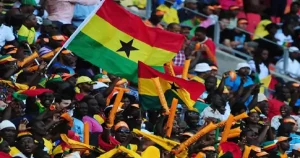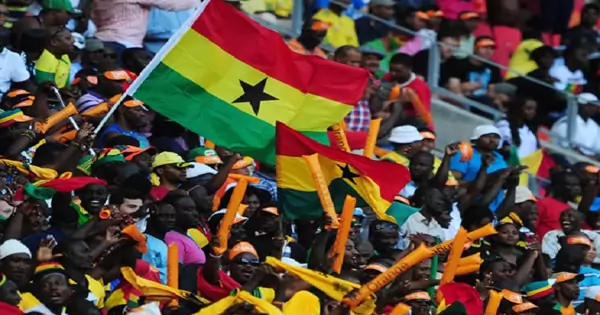NANA KWASI GYAN-APENTENG’S AFCON 24 DIARY 3
I have an idea for a bored academic willing to enliven his or her life in the Ivory Tower. This would study the relationship between the Ghana Black Stars and Ghanaians.
This study could fit into several disciplines, including history, sociology, communication, medicine, psychology, engineering, linguistics, space exploration, music, religion, etc., or it could be a multidisciplinary study of all of the above and more. Even that may not be enough. It would be better to create an entirely new field of study hitherto unknown to the human brain because, in short, this relationship defies understanding.
When I was young, a long time ago, all Ghanaians supported the Black Stars. I said ALL, and we showed it. Black Stars match days were carnivals, and they began days, sometimes weeks, especially when Nigeria was the foe before the day arrived. Buntings, flags, shirts, scarves, and anything with national colours were deployed. Most vehicles were appropriately decorated, and drivers blew their horns in ecstatic support. The media, which initially consisted of one radio station (yes, read that again at your leisure!) and a few newspapers, rallied support by interviewing players, coaches, supporters, and administrators and carried riveting features on the forthcoming match.
Matchday witnessed a plethora of activities and displays; the climax would be around noon when people paraded in towns and villages or trooped to the stadium if they were lucky to live in the venue’s location. Then, a few minutes before the start of the game, the whole country would go quiet as people clustered around radio sets. In the pre-TV days, radio was the only means of receiving live reports, and the commentators were superb. Listening to the radio was like being at the stadium. The arrival of TV in 1965 changed the situation slightly because people now clustered around the few TV stations that showed matches live.
Today, the situation is different. Last Sunday, as I usually do on BS match days during tournaments, I wore my Black Stars shirt and did a walkabout in my neighbourhood shopping mall. Hundreds of people, mostly young men, were milling around, ready to watch the match on TV sets provided at vantage points. There were no Black Stars paraphernalia in sight. People looked at me as if I were an oddity from a different era, which, of course, I was. I could even sense some hostility, although one or two young boys, too young to know hatred, seemed to admire my outfit.
In the days before the match, media commentators, especially on radio, outdid themselves in showing their contempt for the team. They demonstrate a visceral dislike that our academic researcher would do well to decipher. The commentators are not alone. In what can only be described as a case of cross-infestation, they and their listeners are primarily of one mind.
The irony is that we should be able to support the Stars even better now than in the dim past. We can also better enjoy the tournament. Today, TV, radio, and the internet – pick your choice- deliver matches live in your favourite format. You can participate in shaping the nature of support for the Black Stars or sports in general if you’re so-minded. The team is better prepared. There is definitely more investment now than ever before. We even have a plum sponsorship of 2 million US dollars covering the last World Cup and this AFCON from MTN, which has also flown more than 130 spectators to Côte d’Ivoire with a generous package.

The relationship between supporters and their team is important; it is even organic. Team supporters have been described as the “12th Man” because of the positive impact supporters can make on a team. Teams in all leagues worldwide pay attention to how they nurture their support bases because of this fact. The Black Stars need our support as their base. Our bored academic can unravel the causes of the ruptured relationship, but for now, our team is still at the war front on our behalf, and we have to cast aside the cynical sniping to ensure that we have a happy and assured squad out there.
If we want to enjoy the team’s success, we must be part of fashioning that outcome. The Black Stars of yore, which gave Ghana gravitas beyond its weight around the world, could rely on our support. They produced the result. In turn, we basked in the glory of the team’s victories and lifted our shoulders above our heads. That is the way it works. It is called symbiosis. I told you we can even invoke science to explain our complex relationship!
